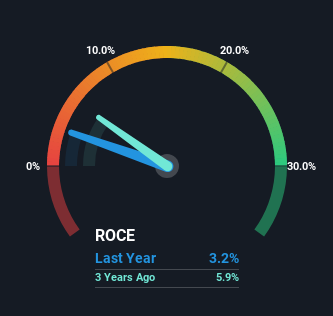- United Kingdom
- /
- Water Utilities
- /
- LSE:UU.
United Utilities Group (LON:UU.) May Have Issues Allocating Its Capital

What underlying fundamental trends can indicate that a company might be in decline? Typically, we'll see the trend of both return on capital employed (ROCE) declining and this usually coincides with a decreasing amount of capital employed. This indicates to us that the business is not only shrinking the size of its net assets, but its returns are falling as well. On that note, looking into United Utilities Group (LON:UU.), we weren't too upbeat about how things were going.
What Is Return On Capital Employed (ROCE)?
For those that aren't sure what ROCE is, it measures the amount of pre-tax profits a company can generate from the capital employed in its business. Analysts use this formula to calculate it for United Utilities Group:
Return on Capital Employed = Earnings Before Interest and Tax (EBIT) ÷ (Total Assets - Current Liabilities)
0.032 = UK£446m ÷ (UK£15b - UK£576m) (Based on the trailing twelve months to March 2023).
Therefore, United Utilities Group has an ROCE of 3.2%. Even though it's in line with the industry average of 3.2%, it's still a low return by itself.
View our latest analysis for United Utilities Group

Above you can see how the current ROCE for United Utilities Group compares to its prior returns on capital, but there's only so much you can tell from the past. If you'd like to see what analysts are forecasting going forward, you should check out our free report for United Utilities Group.
SWOT Analysis for United Utilities Group
- No major strengths identified for UU..
- Interest payments on debt are not well covered.
- Dividend is low compared to the top 25% of dividend payers in the Water Utilities market.
- Expensive based on P/E ratio and estimated fair value.
- Annual earnings are forecast to grow faster than the British market.
- Debt is not well covered by operating cash flow.
- Dividends are not covered by earnings and cashflows.
- Revenue is forecast to grow slower than 20% per year.
What Can We Tell From United Utilities Group's ROCE Trend?
There is reason to be cautious about United Utilities Group, given the returns are trending downwards. Unfortunately the returns on capital have diminished from the 5.5% that they were earning five years ago. On top of that, it's worth noting that the amount of capital employed within the business has remained relatively steady. Since returns are falling and the business has the same amount of assets employed, this can suggest it's a mature business that hasn't had much growth in the last five years. If these trends continue, we wouldn't expect United Utilities Group to turn into a multi-bagger.
The Bottom Line On United Utilities Group's ROCE
In the end, the trend of lower returns on the same amount of capital isn't typically an indication that we're looking at a growth stock. But investors must be expecting an improvement of sorts because over the last five yearsthe stock has delivered a respectable 69% return. Regardless, we don't feel too comfortable with the fundamentals so we'd be steering clear of this stock for now.
United Utilities Group does come with some risks though, we found 3 warning signs in our investment analysis, and 2 of those can't be ignored...
If you want to search for solid companies with great earnings, check out this free list of companies with good balance sheets and impressive returns on equity.
New: AI Stock Screener & Alerts
Our new AI Stock Screener scans the market every day to uncover opportunities.
• Dividend Powerhouses (3%+ Yield)
• Undervalued Small Caps with Insider Buying
• High growth Tech and AI Companies
Or build your own from over 50 metrics.
Have feedback on this article? Concerned about the content? Get in touch with us directly. Alternatively, email editorial-team (at) simplywallst.com.
This article by Simply Wall St is general in nature. We provide commentary based on historical data and analyst forecasts only using an unbiased methodology and our articles are not intended to be financial advice. It does not constitute a recommendation to buy or sell any stock, and does not take account of your objectives, or your financial situation. We aim to bring you long-term focused analysis driven by fundamental data. Note that our analysis may not factor in the latest price-sensitive company announcements or qualitative material. Simply Wall St has no position in any stocks mentioned.
About LSE:UU.
United Utilities Group
Provides water and wastewater services in the United Kingdom.
High growth potential second-rate dividend payer.


